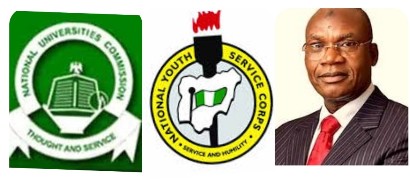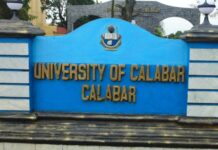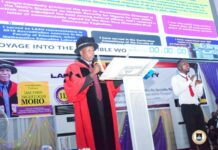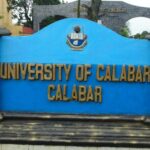By Umar Audu
The story of obtaining questionable degree certificates from universities in Benin Republic and Togo is not new. What is new, however, is how these certificates can be obtained with ease and speed.
Cotonou is not only famous for the thriving second-hand car business popularly called ‘tokunbo’; it also serves as a mecca for those in need of express degrees.
The requirements are O-level certificates – fake or genuine – and the required amount of money, which varies depending on the course, urgency and class of degree.
And in less than a month or two, one can be a ‘graduate’ from any of the mushroom universities dotted across the two West African countries.
The beneficiaries of these substandard certificates, who are either unintelligent or lazy, compete for jobs and other opportunities with hard-working graduates who undergo academic rigours for at least four years to obtain their degrees.
DAILY NIGERIAN gathered that some use the questionable certificates to get civil service jobs or aspire for elective offices, while some of their peers with hard-earned credentials languish in joblessness and hopelessness.
To get first-hand information on how these certificate racketeers operate, DAILY NIGERIAN reporter, Umar Audu, went undercover to investigate the booming business.
Obtaining a Cotonou degree
In December 2022, our reporter reached out to a racketeering syndicate that specialises in selling the infamous degree certificates from the neighboring countries to willing buyers at an ‘affordable rate’.
The agent however gave our reporter the option of “studying” for a year or month, but he opted for the month option.
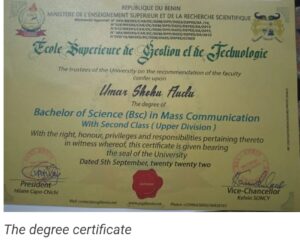
“That’s not a problem; we can help. If the money is ready, we can help you out. We have done it for a lot of people. If you make the payment now, the results will be ready next month,” he assured.
Our reporter’s choice of mass communication from any “university” in Cotonou was premised on the fact he could easily scale through the screening as he had knowledge of the course.
The agent gave the reporter the breakdown of the amount to pay, which included tuition fees, an evaluation letter, a resident permit, immigration stamps at the border post and transportation.
On December 27, 2022, our reporter made the payment and was issued a payment receipt.
True to the agent’s words, the certificate and transcript of Ecole Superieure de Gestion et de Technologies, ESGT, Cotonou, Benin Republic, were delivered to his office on February 17, 2023.
The degree certificate
The transcript indicated that this reporter commenced the institution in 2018 and graduated on September 5, 2022.
Unfortunately, there was a slight mistake on the transcript, so it had to be transported back to Cotonou for correction, and one month later, the corrected version was received on March 29.
Prior to that, this reporter was never issued an admission letter or knew about the school the agent was processing for him.
All the agenct said was, “don’t worry, everything will be sorted out.”
Like miracle, our reporter “finished” the four-year degree programme in less than two months without application, registration, studying, writing exams or crossing Nigerian border.
But despite having the certificate and transcript in his possession, the reporter had fears they could be fake, until he discovered a scan code placed on the left bottom of the transcript. And when the reporter scanned through, it directed him to the website of ESGT University, indicating that he is a genuine product of the institution.
On its website, ESGT, established in 2009, said, “It is an institution built upon a vision that enables individuals from a mix of different nationalities and cultures to get the best in undergraduate and postgraduate international education.”.
The institution is fully accredited by both the governments of the Benin Republic and Nigeria. It offers over 30 courses in management sciences, social sciences, applied and natural sciences as well as technology.
It was gathered that the racketeering agents in Nigeria work hand-in-hand with the top management of the university campus in Cotonou, whose registrar and English section coordinator are Nigerians.
“The evaluation letter doesn’t come from us. It comes from the Ministry of Education. They are the ones causing the delay; they want more bribes, but we are still negotiating with them. But please be a little bit patient with us; it’s a general problem,” he said in response our reporter’s complaint over evaluation delay.
After payment of additional money through the agent, the evaluation letter was eventually released. The letter is a mandatory requirement for NYSC mobilisation.
In separate letters dated May 25 and 26, addressed to the director general of the National Youth Service Scheme, NYSC, the Federal Ministry of Education confirmed that the ESGT is on the ministry’s list of accredited institutions.
The letter, which was signed on behalf of the minister by the deputy director of Evaluation and Accreditation, Koli Salihu-Mongodiba, also cleared 51 ESGT graduates to participate in the NYSC, “having met all the requirements set by the ministry”.
“The institution is on the ministry’s list of accredited institutions in Benin, and the bachelor degrees awarded to the students as indicated on the attached list are equivalent to bachelor degrees awarded by any Nigerian university in a similar field of study,” the letter read in part.
DAILY NIGERIAN investigation reveals that agents of these mushroom universities connived with some corrupt officials at the Federal Ministry of Education to get evaluation letters for a fee ranging from N40,000 to N70,000 per “graduate”.
Double NYSC participation
When the NYSC opened its portal for 2023 Batch B registration in June, this reporter was afraid that the system would reject him outright as he had genuinely participated in the scheme in the past.
But soon after he began the screening, his fears was allayed as the NYSC seemingly lacked the digital tool to flag attempts to participate in the scheme twice or more.
The only initial obstacle he had was when he input the email and phone number he used during his genuine NYSC registration, a message popped up saying, “This email and phone number have already been registered.” Our reporter then immediately switched to his alternative phone number and email.
He therefore created a new profile, uploaded all the required documents, including fingerprints.
The next stage was physical verification of documents. Usually, there are two stages of verification — physical and online evaluation.
On July 3, while registration was going on smoothly for students who obtained certificates from less questionable foreign institutions, those from Benin Republic and Togo were subjected to a more thorough screening exercise.
At that stage, NYSC officials rejected our reporter’s evidence of Cotonou residency, but after months of back-and-forth, he was eventually linked with an immigration official who facilitated the stamping of his passport to show evidence of multiple entry and exit from Seme Border between 2018 and 2022.
A page in the reporter’s passport, showing exit and entry stamps both Nigerian and Beninois immigrations.
Although our reporter never crossed any Nigerian borders, the officer was able to get his passport stamped by both Nigerian and Beninois immigration agents.
After the tedious process, DAILY NIGERIAN reporter was eventually cleared for both physical and online evaluations, and on November 22, posted to Cross River for one year service.
My experience at Obubra
I arrived at the orientation camp in Obubra, a predominantly rice farming community, at exactly 3:30 p.m. on Sunday, 26, 2023, for the 21-day orientation course.
On the posting letter every prospective Corp member was expected to arrive the camp from Friday November 24 to Sunday November 26, 2023.
I scheduled my journey for Saturday, and there was no direct flight going to Calabar on that day.
So I had to fly to Enugu, from where I traveled by road for 250 kilometres before arriving at Obubra.
As expected, we were subjected to security checks at the gate by operatives consisting of Nigeria Police, Nigeria Military, and Nigerian Security and Civil Defence Corps.
After successful screening at the gate, we were asked to take a certain direction where we saw some NYSC officials who asked us to write down our names, and immediately gave us room allocation.
The registration spot for foreign graduates is different from that of home-trained graduates.
The female official I met requested I bring out all the documents I used in applying for NYSC, which I obliged. I was subjected to another round of written and oral interviews. I answered all the questions diligently, and I was cleared and given a tag.
The tags contain my state code and the platoon number.
I moved to Platoon 9, where I was deployed. My credentials were documented and I was given a complete NYSC kit.

While accepting the kits with mixed reactions, I reminisced about the experience I went through at NYSC orientation camp in Ede in 2018.
It was a similar process, except that in 2018 I spent four years to study in a Nigerian university before being allowed to participate in the scheme.
I hurriedly dashed to the hostel to change my mufti and put on the approved dress.
Due to the regimented nature of the camp activities, the camp director and state coordinator, at every opportunity, would appeal to corps members with underlying illnesses to apply for exit if they couldn’t cope with the stress.
I took the advantage of that offer and applied for exit after spending eight days in Obubra Camp.
Having received a payment of N39,400 as bicycle and November allowances, I refunded the money to the federal government account through Remita.
Where the problem lies
In April 2018, the federal government, in a bid to tackle the menace of the proliferation of substandard degrees, announced the blacklisting of some questionable institutions in Benin, Cameron, Ghana, and Togo.
Adamu Adamu, the then minister of education, set up a 16-member committee to screen 40,000 Nigerians with degrees obtained from foreign tertiary institutions.
But despite the measures, the business seems to be thriving – no thanks to corrupt officials in the Federal Ministry of Education, Nigerian Immigration Services, and other government agencies who collect bribes to lower the bar.
A source familiar with the working of the syndicate blamed the Department of Education Support Services at the Federal Ministry of Education for the high rate of the “importation” of shady degrees into the country.
The source said the department, headed by Giginna Lydia Ifeyinwa, had granted accreditation to institutions that have failed to meet the required standard.
He noted that almost all the universities attended by Nigerians in Benin and Togo lack the necessary approval to offer courses in English language, and they operate in contravention of UNESCO declaration of language instruction.
“None of these mushroom universities have the accreditation to offer courses in English language.
“The former minister of education Adamu Adamu once dispatched some officials of the ministry to Cotonou, and Togo on a fact-finding mission.
“The team, which was led by a former director of Education Support Services, Justina Ibe, discovered that there was no university in Cotonou that had the approval to offer courses in English Language.
“They also discovered that most of the institutions offered health related courses despite not having laboratories and other facilities to offer such courses.
“So the evaluation unit stopped evaluating certificates of pharmacy, medical lab sciences nursing and others until a team of NYSC, ministry and the relevant professional bodies visited the country and ascertain the standard of the university.
“Presently, the ministry has evaluated certificates of pharmacy and medical lab awarded by Bilingual University Togo, contrary to ministerial directives.
“Another challenge is that some of the experts in the evaluation and accreditation division who understand the job have been transferred out of the unit. Most of the officials in that division now are grossly inexperienced.
“Is it surprising that there are no Arabic or French language experts in that unit, and these are people who easily evaluate French and Arabic certificates,” said the source.
Federal Ministry of education, NYSC, NIS, ESGT react
When contacted for response, the director of Press and Public Relations of the Ministry of Education, Bem Goong, requested our correspondent show him all the documents used in the investigation before he could respond.
And when the correspondent politely declined, he dared him to go ahead and publish the report.
He said: “But if you are saying someone committed that kind of academic fraud and is known to the Ministry of Education, I will require evidence to dig deeper. And if you can’t provide those documents, you can please go ahead and publish your report.”
On his part, the NYSC director of Press and Public Affairs, Eddy Megwa, said the scheme is aware of the activities of some Nigerians to cut corners in their bid to participate in the youth service.
Mr Megwa boasted that it would be almost impossible for any person to beat the NYSC integrated ICT system.
He said, “What you said is part of what NYSC is contending with. Ordinarily, we shouldn’t have any reason to scrutinize any graduate from a tertiary institution outside the country, especially when one is accredited by the Federal Ministry of Education.
“But overtime, we discovered that some so-called graduates cannot even express themselves; they cannot even write a simple sentence. That raised the curiosity of the NYSC.
“If you say you are a foreign-trained graduate, NYSC will now subject you to a little test, to know if you are actually a graduate. Since the inception of NYSC, we have not done this.
“But when we discovered the problem, NYSC sat up and began to ensure thorough scrutiny in our screening.
“After training in camp, you will send them to go and teach in a secondary school, and the person can’t say a single sentence. They begin to speak in broken English. That defames the image of the Nigerian nation, not NYSC, because we don’t train them. We receive graduates from institutions.
“And in every human endeavour, you can only do your best; attaining that point of perfection is another thing. But it would be very difficult for anybody to beat the procedure we have put in place,” he said.
Unbeknownst to Mr Megwa that our reporter had previously served, he said it’s almost impossible for anybody to participate in the NYSC twice.
“We have an integrated ICT system. Once you are captured in our database and you come back to register again, our system will indicate that this person has served before. Except if the person will change his thumb, which is practically impossible,” he said.
According to the NYSC spokesman, even in Nigeria, some institutions are involved in degree racketeering.
“Even some universities and polytechnics in Nigeria engage in such activities. You will see bread and groundnut sellers giving money to student affairs officers, and they will enroll their names as if they have gone through the system. And of course, they will push them down to NYSC. Some institutions were found culpable, and the people involved were punished severely. All these things have now gone down,” he added.
But the spokesperson for the Seme Border Command of the Nigerian Immigration Service, Enoch Aparshe, denied knowledge that some officers at the command were granting entry and exit clearance without physically assessing the passport holders.
“I’m not aware that our officials engage in such nefarious acts, and all I know is that it is the Ministry of Education that validates their certificates.
“At the Seme border here, we don’t backdate stamps. International passports are digitised, and the stamps are issued in such a way that you cannot backdate them.
“And for the ECOWAS passport, which is manual, it is very unlikely, and I am not sure any immigration personnel will want to engage in such risk, at the detriment of their job,” he added.
ESGT — the foreign university that awarded our reporter a degree — did not respond to DAILY NIGERIAN email on the matter.
This report was supported by the Wole Soyinka Center for Investigative Journalism, WSCIJ, in collaboration with the MacArthur Foundation


